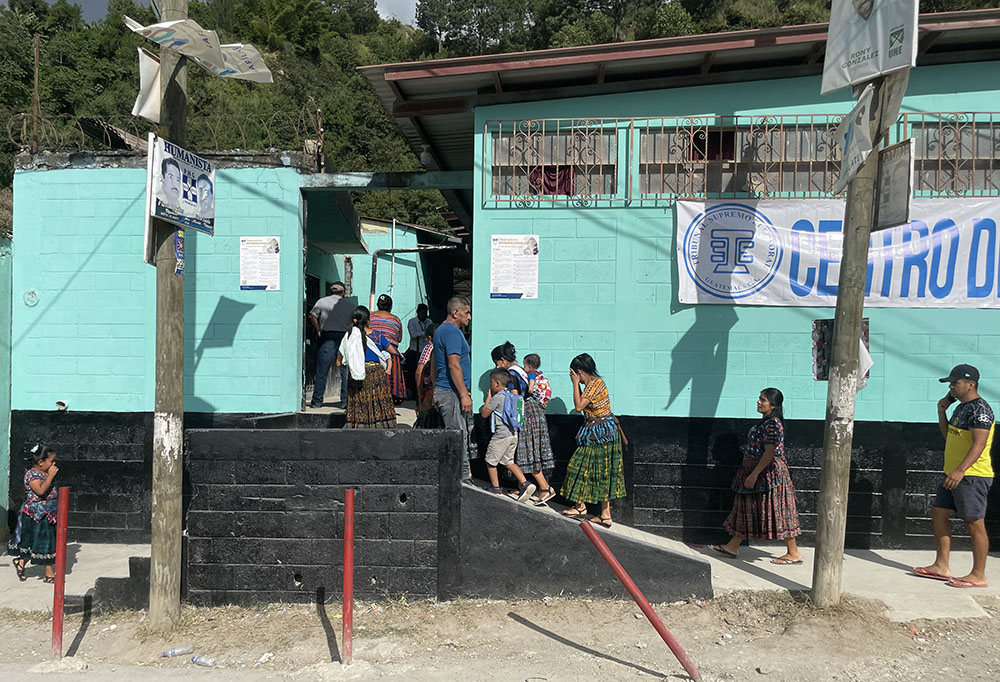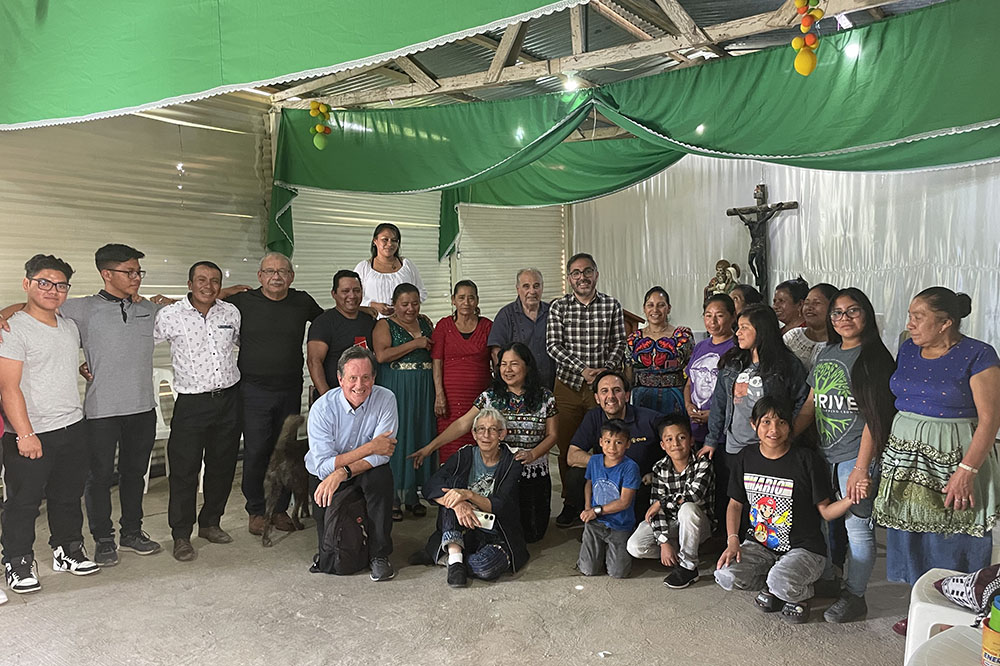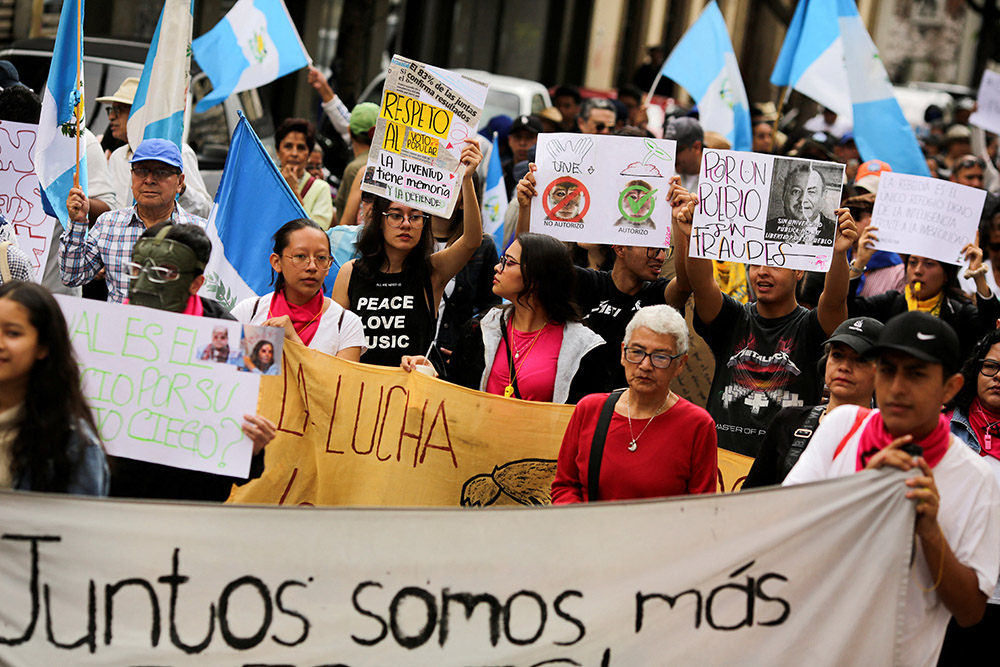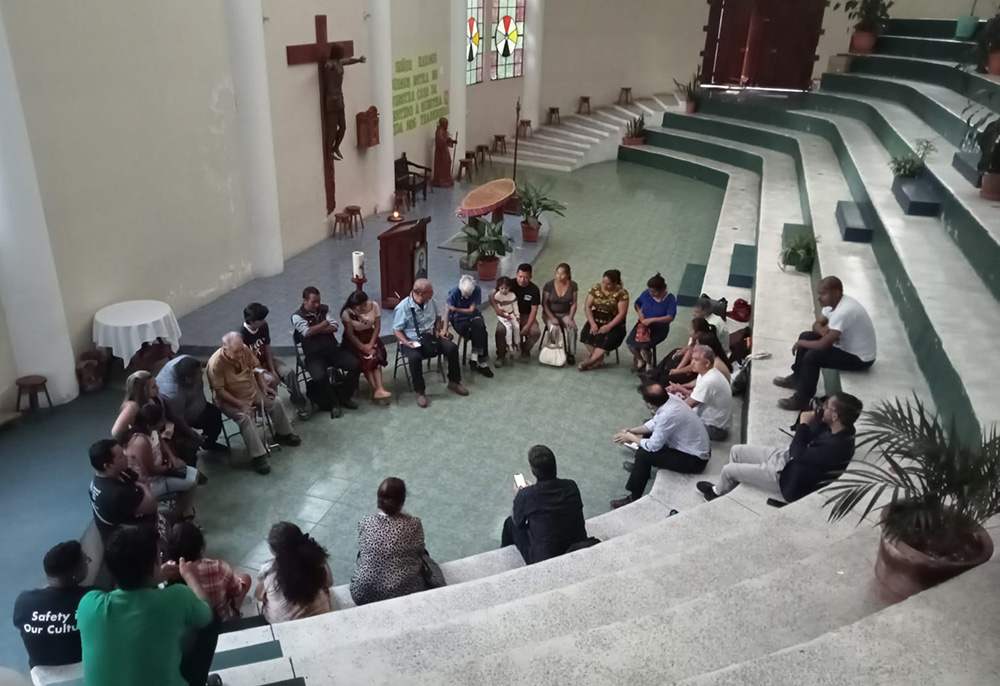
Families enter a voting center in Chinautla, on the edge of Guatemala City, in mid-August. (Courtesy of Faith in Action)
It was a shock to Guatemala's ruling elite when progressive reformer Bernardo Arévalo won an overwhelming victory in presidential elections on Aug. 20. The vote was the culmination of a campaign driven by average Guatemalans who have struggled for 70 years to achieve real democracy and to combat corruption.
Arévalo's presidency is not yet secure. But, as members of an international faith leader delegation, we had the opportunity to witness firsthand Guatemalans' hunger for democracy and genuine change.
A few weeks ago, at the invitation of Cardinal Álvaro Ramazzini of Huehuetenango, Faith in Action and the Hope Border Institute organized a group of faith leaders from five countries who traveled to Guatemala to witness the historic presidential runoff election on Aug. 20.
The delegation, representing the Root Causes Initiative, spent six days accompanying Guatemalan faith and civic leaders amid the hopes, fears and threats that surrounded the election. We spent three days before the vote meeting and talking with clergy, women religious, parishioners and human rights activists to better understand the political, social and religious context there.

Members of a delegation of faith leaders from five countries gather with parishioners after Mass at the Chapel of Santa Anita in Chinautla, Guatemala, in mid-August. (Courtesy of Faith in Action)
On election day, we visited several voting centers in Guatemala City and San Marcos to observe how the election was unfolding (peacefully and with high levels of voter participation) and met with leaders of churches and Indigenous communities to hear their perspectives on the process.
We then spent two days after the election discussing and reflecting on the results with parishioners, faith leaders and pro-democracy groups. We also met with high level State Department officials at the U.S. Embassy.
For 70 years, a small ruling elite of politicians, business leaders, military leaders and narco-traffickers have abused human rights, undermined democracy, exploited natural resources and used violence to maintain political power and economic control. The elite have enjoyed impunity from any consequences for their actions and have generally been supported by one U.S. administration after another, along with multinational corporations angling to extract riches while destroying the environment.
All of these dynamics have compelled Guatemalans to desperately flee their country in growing numbers, especially in recent years.
The ruling elite was first taken by surprise in June when, in the initial round of the presidential election, reform candidate Arévalo of the Movimiento Semilla (Seed Movement), finished second among 22 eligible candidates. As a result, he made it to the runoff election, where he faced an establishment candidate, Sandra Torres, on Aug. 20.

Supporters of presidential candidate Bernardo Arévalo of the Seed Movement party protest in Guatemala City July 13 outside the Guatemala attorney general's office to demand respect for the results of the first round of presidential elections. (OSV News/Reuters/Cristina Chiquin)
Arévalo's platform of fighting corruption and pursuing structural reforms to open up economic opportunity for all Guatemalans struck a deep chord among communities across the country who longed for change.
People also remembered that his father, Juan José Arévalo, had served as the first democratically elected president of Guatemala in the late 1940s and instituted reforms such as the minimum-wage law, expanded voting rights and increased funding for education.
The 1954 overthrow of President Jacobo Arbenz's government by the CIA, with the support of the United Fruit Corporation and Catholic Church leaders, put an end to that first flowering of democracy in Guatemala. More than three decades of military repression and internal armed conflict ensued, only to be followed by an illegitimate democracy that has prevented Guatemala to this day from addressing the social and economic needs of its people, while allowing corruption to thrive.
In 2006, Guatemala embarked on an international experiment to create accountability for human rights abuses and genocide against Indigenous communities during the civil war. Guatemalan civil groups, with help from the United Nations, created the International Commission against Impunity in Guatemala (CICIG). Guatemalans began to root out systemic corruption and bring human rights abusers to justice.
Advertisement
But 12 years later, the Guatemalan elite, with support from the Trump administration, shut down CICIG and began a systematic campaign to persecute, imprison and exile judges, prosecutors, reporters and human rights activists who had previously worked to fight corruption.
By ending CICIG and taking over the main judicial and electoral institutions in the country, the elite, who are often referred to as the Pact of the Corrupt, sought to control Guatemala while creating a façade of democracy. Guatemalan President Alejandro Giammattei and his attorney general, María Consuelo Porras, succeeded in disqualifying many opposition candidates.
But they did not account for Arévalo and Movimiento Semilla.
"This is new for us," said a parishioner at Holy Cross Parish in Chinautla, reflecting on Guatemala's 70-year history of oppression and economic inequality and the hope suddenly unleashed by the Semilla Movement. "It's a beautiful moment and we have to recognize that."
When the votes were tallied on election night, Arévalo had won nearly 60% of the vote and had garnered almost 1 million more votes than his opponent. In many small communities across the country, spontaneous celebrations erupted as people considered the possibility of something new.

Staff and parishioners of Santa Cruz Parish in Chinautla, Guatemala, share their hopes and concerns regarding the election in mid-August. (Courtesy of Faith in Action)
Still, nothing is guaranteed. The new president will not be sworn in until Jan. 14. Credible death threats have been received by President-elect Arévalo and the vice president-elect; their party was suspended by the current attorney general on Aug. 30. The losing candidate and her party have not conceded the election despite the massive vote differential.
The international community, including U.S. President Joe Biden and Vice President Kamala Harris, were quick to congratulate Arévalo on his clear and transparent victory. The United States, the Organization of American States and the European Union will need to continue delivering — publicly and privately — a clear and forceful message that the will of the Guatemalan people must be respected.
Any blatant attempts to disrupt the peaceful transfer of power must be met with all of the diplomatic tools at the disposal of the State Department and U.S. Treasury, including the imposition of tough financial sanctions against individuals responsible for anti-democratic and illegal actions.
We will remember the many meaningful and heartfelt encounters we experienced during our visit, including this: The father of a teenager and two young adults welled up as he offered a blessing on one of our meals, and prayed that the election might be the start of a new opening for change in Guatemala so that his children might have the option to make their future there.
Our government has a moral obligation and a clear self-interest in standing with the Guatemalan people during this historic transition and supporting the success of the new Arévalo administration. That represents the only compassionate and strategic response to forced migration from Guatemala.







